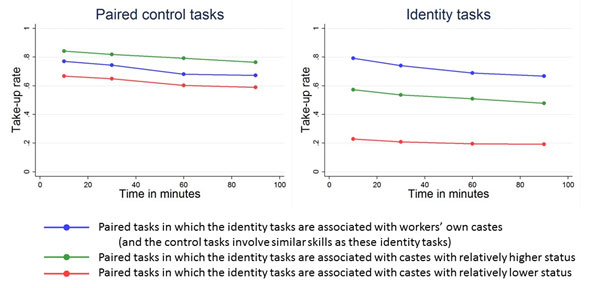In today’s India, to what extent do people avoid jobs solely due to their sense of caste identity? This article discusses an experiment in rural Odisha that involves offering one-day jobs to workers interested in temporary work. It finds that workers are willing to forego substantial earnings, sometimes as much as 10 times their daily wages, to avoid work that conflicts with their caste identity.
Identity – one’s concept of self – is a powerful motivator of human behaviour. Some people may avoid otherwise desirable job opportunities due to concerns about upholding their identity. One setting where this may have significant economic implications is the Indian labour market, in which 16.8% of men still work in their castes’ (jati) traditional occupations (Cassan et al. 2019). In today’s India, to what extent do people avoid jobs solely due to their sense of caste identity?
This question is not straightforward to answer. While identity concerns could cause some caste groups to prefer certain occupations, these groups tend to differ along many other dimensions, including training and outside options. In addition, it is usually difficult to distinguish the effect of identity concerns from that of social image, that is, how one is perceived by other people. For example, people may steer clear of certain jobs to avoid social sanctions and ridicule rather than to preserve their identity.
In recent research (Oh 2020), I provide the first experimental test of how identity concerns affect job preference. Offering one-day jobs to workers interested in temporary work in rural Odisha, I show that identity concerns have a large negative impact on workers’ willingness to take up certain jobs. The findings indicate that identity is an important constraint on labour supply in this setting, underscoring the need to incorporate identity considerations in the study of Indian labour markets.
Designing an experiment on identity
Social theories on identity posit that it can motivate people to avoid performing jobs or tasks that are associated with social groups different from their own (for example, Burke and Stets 2009). Such effects may be stronger if the social groups associated with the jobs are perceived as having relatively lower social status (Tajfel and Turner 1979). In addition, individuals seek to avoid violating internal rules of behaviour (Akerlof and Kranton 2000, Bénabou and Tirole 2011). Spending even very small amounts of time on an identity-inconsistent task could be an unacceptable violation.
Motivated by these ideas, I examine people’s reactions to jobs that involve spending only a little bit of time on tasks that are associated with specific caste groups. In rural Odisha, caste constitutes a central part of people’s identity, and the social hierarchy of castes is widely recognised. In addition, castes have historical links to specific occupations, and these links often extend to simple tasks associated with those occupations. Before the experiment, I ran two surveys to establish the connections between castes and tasks and also the ranking of seven castes selected for the experiment.
The experiment elicited 630 workers’ willingness to take up job offers that involved spending some time on different tasks. All offers involved working on a default manufacturing task and an additional task for a total of five hours, and provided the same fixed wage. The additional task varied across offers, was to be performed in private, and differed in its caste association (associated with own, higher, or lower caste; or unassociated). The time allotted to the additional task could be as much as 90 minutes, or as little as 10 minutes. Workers evaluated 32 different offers (involving eight kinds of additional tasks, and four time variations) and were asked to choose whether to take up each one as if it were a single, take-it-or-leave-it offer. At the end of this elicitation, one offer was randomly selected for each worker. If the worker had agreed to take up the offer, the worker could complete the job to receive the promised wage.
Many workers turned down job offers that required spending just 10 minutes on caste-inconsistent tasks
I compare the take-up rates of offers involving ‘identity tasks’ (tasks associated with specific castes, that is, washing clothes, mending leather shoes, and sweeping latrine floors) to those involving ‘paired control tasks’ (involving similar skills as the above but without any caste associations, that is, washing farming tools, mending floor mats, and sweeping animal sheds). Figure 1 below plots the average take-up rates of job offers against the time required on additional tasks. The flatness of the lines shows that take-up rates vary little with spending additional time on tasks.
Figure 1. Average take-up rates of job offers against time required on additional tasks
When a worker’s own caste is closely associated with an identity task, the take-up rate of the identity task is similar to that of the paired control task involving similar skills (blue lines have similar heights across panels). However, when identity tasks do not match the worker’s own caste, the take-up rate is lower than is observed in the control counterpart. In addition, take-up is much lower when the associated caste has a lower relative rank. The take-up rate of the identity task is 23 percentage points lower even when its associated caste ranks higher than the workers’ caste (green line), and 47 percentage points lower when the associated caste ranks relatively lower (red line).
To determine whether concerns about social image as opposed to identity could explain the effects on take-up, I randomised whether or not workers’ decisions were publicised to their neighbours. I find similar effects on take-up across these privacy ‘treatments’, which suggests that identity is the main driver of these effects. A likely explanation is that workers are intrinsically motivated by their caste identity to refuse certain offers even before considering social consequences. This is in line with workers’ responses in a follow-up survey, which frequently cite internal feelings of shame or caste-related rules as the reasons for turning down offers.
Many workers refused to do caste-inconsistent tasks for 10 minutes even when offered 10 times their daily wage
I ran a supplementary experiment to quantify the wage that workers would be willing to forego in order to avoid engaging in caste-inconsistent tasks. Workers were hired for a one-day job working on a default manufacturing task. Then they were unexpectedly given a chance to switch to a different task for part of the remaining working time. Similar to the first experiment, switching offers could involve the identity tasks or the paired control tasks. In addition, switching offers could provide a bonus wage in addition to the default wage. Workers could refuse these offers to continue with their original arrangement. 43% of workers refused a bonus worth 10 times their daily wage in order to avoid spending 10 minutes on tasks associated with other castes. This rate is 29 percentage points larger compared to when offers involved the paired control tasks. Again, the effect is invariant to whether or not workers’ decisions were publicised.
Implications
The experimental findings indicate that identity concerns constrain labour supply decisions among casual labourers in Odisha, causing them to turn down certain job offers even at large economic costs. This identity channel is one of several through which the caste system still exerts influence on the Indian labour market (Mosse 2018, Munshi 2019). Failure to pursue certain jobs due to identity may contribute to misallocation of talent in the Indian economy. Hence, this study highlights the need to account for the distortions resulting from identity concerns when studying labour market efficiency (as in Cassan et al. (2019), for example).
A part of this article originally appeared in World Bank Blogs – Development Impact.
Further Reading
- Akerlof, George A and Rachel E Kranton (2000), “Economics and Identity”, Quarterly Journal of Economics, 115(3):715-753.
- Bénabou, Roland and Jean Tirole (2011), “Identity, Morals, and Taboos: Beliefs as Assets”, Quarterly Journal of Economics, 126(2):805-855.
- Burke, PJ and JE Stets (2009), Identity Theory, Oxford University Press.
- Cassan, G, D Keniston and T Kleineberg (2019), ‘A division of laborers: Identity and efficiency in India’, Working Paper.
- Mosse, David (2018), “Caste and development: Contemporary perspectives on a structure of discrimination and advantage”, World Development, 110:422-436.
- Munshi, Kaivan (2019), “Caste and the Indian Economy”, Journal of Economic Literature, 57(4):781-834.
- Oh, S (2020), ‘Does Identity Affect Labor Supply’, Centre for Development Economics and Policy Working Paper, Columbia University.
- Tajfel, H and J Turner (2010), ‘An integrative theory of intergroup conflict’, in T Postmes and NR Branscombe (eds.), Key readings in social psychology. Rediscovering social identity, 173-190, Psychology Press.




 29 July, 2020
29 July, 2020 





By: JOHN KURIEN 30 July, 2020
Interesting conclusions. However, this may be one of the reasons for migration of less-skilled workers from Orissa to the Southern states of India. Once you are away from the gaze of your peers and community, the kind of job offered and your caste identity may matter less? This is clearly evident with regard to workers from Kerala who go to the Gulf Countries.